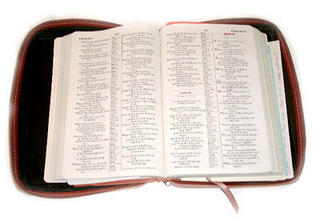
We as Catholics hear this question a good deal. We are also asked, why won't the Church allow Catholics to read the Bible? Catholics do read the Bible, and are encouraged by the Church to do so. Many who accuse the Church of discouraging the faithful to read the Bible, both Old and New Testament, have no idea about the teachings and guidance of the Church in the reading of Holy Scripture. A great number of Popes and Saints have encouraged the reading of Holy Scripture by the faithful., and indeed, even today the Catechism of the Catholic Church encourages the reading of Holy Scripture by the faithful. Where the confusion lies in this idea of Catholics not reading the Bible, is that we as Catholics know that only the Holy Spirit through the Church is the sole interpreter of Holy Scripture for the guidance and inspiration of the faithful.
The Catechism of the Catholic Church regarding Holy Scripture instructs the faithful:
123 Christians venerate the Old Testament as true Word of God. The Church has always vigorously opposed the idea of rejecting the Old Testament under the pretext that the New has rendered it void (Marcionism).
129 Christians therefore read the Old Testament in the light of Christ crucified and risen. Such typological reading discloses the inexhaustible content of the Old Testament; but it must not make us forget that the Old Testament retains its own intrinsic value as Revelation reaffirmed by our Lord himself. Besides, the New Testament has to be read in the light of the Old. Early Christian catechesis made constant use of the Old Testament. As an old saying put it, the New Testament lies hidden in the Old and the Old Testament is unveiled in the New.
133 The Church "forcefully and specifically exhorts all the Christian faithful . . . to learn ‘the surpassing knowledge of Jesus Christ,' by frequent reading of the divine Scriptures. ‘Ignorance of the Scriptures is ignorance of Christ.'"
140 The unity of the two Testaments proceeds from the unity of God's plan and his Revelation. The Old Testament prepares for the New and the New Testament fulfills the Old; the two shed light on each other; both are true Word of God.
1437 Reading Sacred Scripture, praying the Liturgy of the Hours and the Our Father—every sincere act of worship or devotion revives the spirit of conversion and repentance within us and contributes to the forgiveness of our sins.
2205 The Christian family is a communion of persons, a sign and image of the communion of the Father and the Son in the Holy Spirit. In the procreation and education of children it reflects the Father's work of creation. It is called to partake of the prayer and sacrifice of Christ. Daily prayer and the reading of the Word of God strengthen it in charity. The Christian family has an evangelizing and missionary task.
The Saints and the Popes made these statements instructing the faithful to read Holy Scripture:
Saint Jerome--I interpret as I should, following the command of Christ: "Search the Scriptures," and "Seek and you shall find." For if, as Paul says, Christ is the power of God and the wisdom of God, and if the man who does not know Scripture does not know the power and wisdom of God, then ignorance of Scriptures is ignorance of Christ.
Saint John Chrysostom (Doctor of the Church)--“To become adult Christians you must learn familiarity with the scriptures”
“But what is the answer to these charges?‘I am not', you will say, ‘one of the monks, but I have both a wife and children, and the care of a household.’ This is what has ruined everything, your thinking that the reading of scripture is for monks only, when you need it more than they do. Those who are placed in the world, and who receive wounds every day have the most need of medicine. So, far worse even than not reading the scriptures is the idea that they are superfluous. Such things were invented by the devil.”
Pope St. Gregory I--“The Emperor of heaven, the Lord of men and of angels, has sent you His epistles for your life’s advantage—and yet you neglect to read them eagerly. Study them, I beg you, and meditate daily on the words of your Creator. Learn the heart of God in the words of God, that you may sigh more eagerly for things eternal, that your soul may be kindled with greater longings for heavenly joy”.
St. Isidore (Bishop and Doctor of the Church)-- “Prayer purifies us, reading instructs us... If a man wants to be always in God's company, he must pray regularly and read regularly. When we pray, we talk to God; when we read, God talks to us."
“Reading the holy Scriptures (the Bible) confers two benefits. It trains the mind to understand them; it turns man's attention from the follies of the world and leads him to the love of God. "
“Two kinds of study are called for here. We must first learn how the Scriptures are to be understood, and then see how to expound them with profit and in a manner worthy of them. A man must first be eager to understand what he is reading before he is fit to proclaim what he has learned."
“The conscientious reader will be more concerned to carry out what he has read than merely to acquire knowledge of it... Learning unsupported by grace may get into our ears; it never reaches the heart. It makes a great noise outside but serves no inner purpose. But when God's grace touches our innermost minds to bring understanding, his word which has been received by the ear sinks deep into the heart.”
Pope Leo XIII--“The solicitude of the apostolic office naturally urges and even compels us…to desire that this grand source of Catholic revelation (the Bible) should be made safely and abundantly accessible to the flock of Jesus Christ”
“...For sacred Scripture is not like other books. Dictated by the Holy Ghost, it contains things of the deepest importance, which in many instances are most difficult and obscure. To understand and explain such things there is always required the 'coming' of the same Holy Ghost; that is to say, His light and His grace...It is absolutely wrong and forbidden either to narrow inspiration to certain parts only of holy Scripture or to admit that the sacred writer has erred... and so far is it from being possible that any error can co-exist with inspiration, that inspiration is not only essentially incompatible with error, but excludes and rejects it as absolutely and necessarily as it is impossible that God Himself, the supreme Truth, can utter that which is not true.”
Pope St. Pius X-- “Nothing would please us more than to see our beloved children form the habit of reading the Gospels - not merely from time to time, but every day.”
Pope Pius XII--“Our predecessors, when the opportunity occurred, recommended the study or preaching or in fine the pious reading and meditation of the sacred Scriptures. ...This author of salvation, Christ, will men more fully know, more ardently love and more faithfully imitate in proportion as they are more assiduously urged to know and meditate the Sacred Letters, especially the New Testament...”
Copyright © 2005 Steve Smith. All rights reserved.

